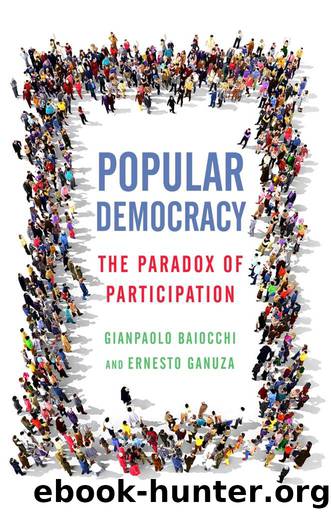Popular Democracy: The Paradox of Participation by Gianpaolo Baiocchi & Ernesto Ganuza

Author:Gianpaolo Baiocchi & Ernesto Ganuza [Baiocchi, Gianpaolo]
Language: eng
Format: azw3
Publisher: Stanford University Press
Published: 2016-12-07T05:00:00+00:00
CHAPTER SIX
The Utopian Undercurrent of Participation
There is no lack of worrying about the state of democracy in the world today, in which democracy’s symbolic victory over any other alternative sits paradoxically alongside two facts: the increasing rule of economic interests over all other concerns, and widespread disaffection with democratic institutions. More and more, democracy appears to be spreading while its meaning seems to be ever more modest. There are more ways than ever to participate democratically today, but the range of decisions within the reach of the demos seems narrower than ever. “We are all democrats now,” writes Wendy Brown, but as her essay also poignantly asks, “what is left of democracy?”1
The two cases of participatory budgeting in Córdoba and in Chicago’s 49th Ward were small instances in much bigger contexts. Each mobilized relatively small pools of participants to decide over circumspect budgetary set-asides. The process in Córdoba came undone under fire from organized civil society groups, while Chicago’s process never managed to mobilize very diverse participants. Neither case propelled very significant changes in community mobilization or existing patterns of governmental routines. Nonetheless they served as powerful demonstrations that participatory budgeting could “work” in their respective contexts—Córdoba serving as an important model for Spain and Europe, and the 49th Ward becoming one of the templates emulated throughout North America.
Efforts like these are emblematic of the contemporary moment of participation and are consistent with how we have come to understand democratic innovations. The objective of the new spirit of government, as we have discussed, is primarily to connect government with citizens. Those who promote democratic innovations today believe these projects effectively “fight apathy” and want to place citizens at the center of governance. Democratic innovations rely heavily on the concept of deliberation, draw on participation from ordinary people, and value inclusion for its own sake. At its core participatory budgeting as instantiated in both sites was a process that brings more voices to the table and allows citizens to debate the common good. Participatory budgeting, like other democratic innovations today, is understood as a compelling way to gather governmental input, build trust in government, and create communities of engaged citizens. More sanguine promoters hold the view that participation, properly instituted, can help solve all kinds of modern-day problems of governance and politics.2
Seldom addressed by mainstream promoters of participation though is the question of subjecting real societal and state power to the decision making emerging out of that participation. There is little talk today of publics mobilized by, say, “deliberative circles,” becoming what Nancy Fraser distinguishes as empowered publics or, in those kinds of debates, the kind of real-utopian empowered participatory governance Archon Fung and Erik Olin Wright advocate.3 As a result of this lack many critics have come to argue that contemporary configurations of participation constitute nothing more than a new form of management of conduct characteristic of the neoliberal era—at best a fantasy, or in Andrew Thompson’s evocative phrase, a pantomime of real democracy.4 The missing element for critics, that
Download
This site does not store any files on its server. We only index and link to content provided by other sites. Please contact the content providers to delete copyright contents if any and email us, we'll remove relevant links or contents immediately.
| Anthropology | Archaeology |
| Philosophy | Politics & Government |
| Social Sciences | Sociology |
| Women's Studies |
The Secret History by Donna Tartt(19053)
The Social Justice Warrior Handbook by Lisa De Pasquale(12187)
Thirteen Reasons Why by Jay Asher(8893)
This Is How You Lose Her by Junot Diaz(6877)
Weapons of Math Destruction by Cathy O'Neil(6265)
Zero to One by Peter Thiel(5787)
Beartown by Fredrik Backman(5737)
The Myth of the Strong Leader by Archie Brown(5500)
The Fire Next Time by James Baldwin(5431)
How Democracies Die by Steven Levitsky & Daniel Ziblatt(5215)
Promise Me, Dad by Joe Biden(5141)
Stone's Rules by Roger Stone(5081)
A Higher Loyalty: Truth, Lies, and Leadership by James Comey(4954)
100 Deadly Skills by Clint Emerson(4921)
Rise and Kill First by Ronen Bergman(4780)
Secrecy World by Jake Bernstein(4741)
The David Icke Guide to the Global Conspiracy (and how to end it) by David Icke(4709)
The Farm by Tom Rob Smith(4502)
The Doomsday Machine by Daniel Ellsberg(4484)
